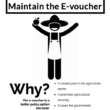Green Party leader Peter Sinkamba says the current mode of supplying fertilizer to farmers using agro-dealers under the electronic voucher system has proven to be fraudulent because it has provided an opportunity for criminals to thrive.
Commenting on a case where a Chinsali based agro-dealer fled with about 600 beneficiaries’ deposits under Farmer Input Support Programme (FISP), Sinkamba said the E-voucher system should be scrapped off because it was a failed project.
“The Farmer Input Support Project, under which there are a lot of strategies that have been developed to try and support the small-scale farmers and peasant farmers, is a fraud project. According to us, it is supposed to be scrapped because it has failed to yield intended objectives. You know, the liberalisation of the agriculture sector, which started in 1993, which is almost over 10 years gone from the time this project was started, we have failed to support farmers so that they can become self-sustaining. Instead, we have provided space for crooked entrepreneurs to rip off either government resources or the peasant farmers resources and this thing has been going on for a long time,” Sinkamba explained.
He suggested reverting to the old system of distributing farming inputs last seen during the UNIP era.
“So, the only way you can deal with this is to reformulate the policy, and we had suggested ourselves that if we had been elected in government, we would have reverted to what used to obtain during the UNIP regime; the districts’ cooperatives unions and the provincial cooperatives unions, which were mandated to distribute fertilizer and other inputs to the peasant farmers and also to be able to buy off from these farmers such that the peasant farmers and small-scale farmers were not at risk of being bound by briefcase entrepreneurs acting in the name of the State. So, unless and until we revert to that kind of programme, year in-year out, the cases of theft or conmen stealing from peasant farmers either stealing their maize or stealing their deposits towards fertilizer or failing to deliver the fertilizer, which has been paid for, these things will continue and we shall continue impoverishing our people,” Sinkamba said.
And Sinkamba argued that the current fertilizer supply system as a whole was fraudulent as it gave an opportunity to criminals to thrive.
He noted that another key factor inhibiting the successful delivery of inputs via the electronic voucher was limited access to smart phones by the majority farmers.
“The current system is a fraud and it can’t deliver, it provides the opportunity for criminals to thrive. The [IFMIS] is part of those bigger programmes, which has failed. You cannot start distributing inputs to peasant farmers and small scale farmers in rural areas using phones. There is this latest strategy where peasant farmers who are people that have not been to school and most of them have those small phones and not smart phones. Now, you expect them to start responding to prompt messages as a way of them participating in the whole programme? I think we need to go back to the basics,” advised Sinkamba.












